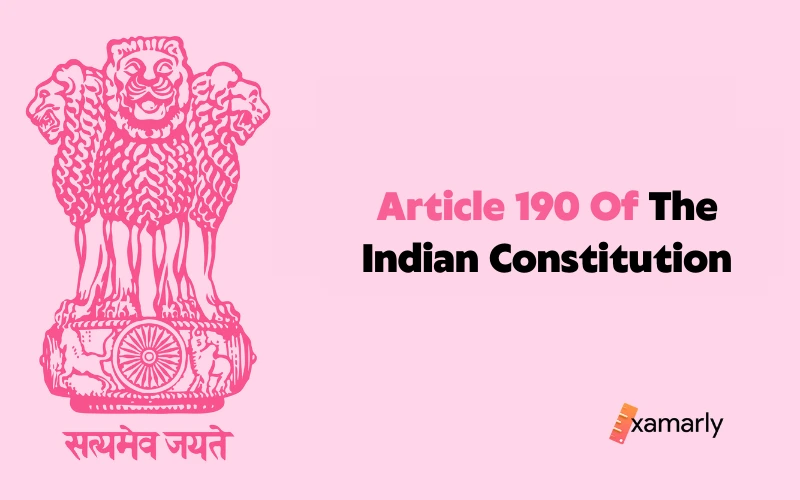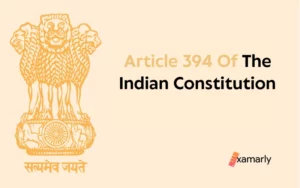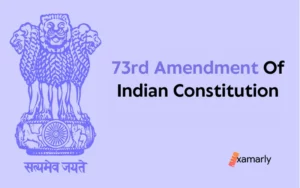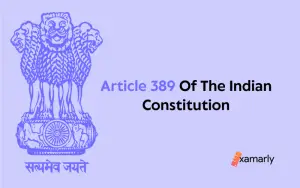Article 190 of the Indian Constitution takes into account the vacancy of seats in the Houses of the Legislature of a State. The vacation of seats applies to the members of the State Legislative Assembly (Vidhan Sabha) and the State Legislative Council (Vidhan Parishad).
Article 190 outlined the conditions under which a member’s seat would be regarded as vacant or unoccupied under some specific conditions.
Read on to learn all the details related to Article 190 of the Indian Constitution and help yourself with a steady preparation for your UPSC examination.
- Article 190 Of The Indian Constitution: Constitutional Provisions For Vacancy Of Seats
- Explanation Of Article 190 Of The Indian Constitution
- Clause (1) Of Article 190 Of The Indian Constitution: Explained
- Clause (2) Of Article 190 Of The Indian Constitution: Explained
- Clause (3) Of Article 190 Of The Indian Constitution: Explained
- Clause (4) Of Article 190 Of The Indian Constitution: Explained
- Amendment It Is Related To
- Summing Up
- FAQs
- Which Part Of The Indian Constitution Does Article 190 Come Under?
- What Is Understood By The First Schedule Of The Indian Constitution?
- How Many Clauses And Sub-clauses Are There In Article 190 Of The Indian Constitution?
- Which Article Is Mentioned In Clause (3) Of Article 190 Of The Indian Constitution?
- What Does Clause (1) And Clause (2) Of Article 191 Say As Mentioned In Clause (3) Of Article 190 Of The Indian Constitution?
- The Constitution (Thirty-Third Amendment) Act, 1974, Amended Which Clause Of The Article 190 Of The Indian Constitution?
- Why Was Article 190 (4) Of The Indian Constitution Used In The Case Of Suspension Of MLAs?
- Which Law Was Instrumental In Amending Article 190 Of The Indian Constitution?
Article 190 Of The Indian Constitution: Constitutional Provisions For Vacancy Of Seats
The Constitution of India mentions the following text as Article 190 of the Indian Constitution. The following lines have been directly quoted from the Indian Constitution itself. It reads as:
“190. Vacation of seats.—
(1) No person shall be a member of both Houses of the Legislature of a State and provision shall be made by the Legislature of the State by law for the vacation by a person who is chosen a member of both Houses of his seat in one house or the other.
(2) No person shall be a member of the Legislatures of two or more States specified in the First Schedule and if a person is chosen a member of the Legislatures of two or more such States, then, at the expiration of such period as may be specified in rules made by the President, that person’s seat in the Legislatures of all such States shall become vacant, unless he has previously resigned his seat in the Legislatures of all but one of the States.
(3) If a member of a House of the Legislature of a State—
(a) becomes subject to any of the disqualifications mentioned in [clause (1) or clause (2) of article 191]; or
[(b) resigns his seat by writing under his hand addressed to the speaker or the Chairman, as the case may be, and his resignation is accepted by the Speaker or the Chairman, as the case may be,] his seat shall thereupon become vacant:
[Provided that in the case of any resignation referred to in sub-clause (b), if from information received or otherwise and after making such inquiry as he thinks fit, the Speaker or the Chairman, as the case may be, is satisfied that such resignation is not voluntary or genuine, he shall not accept such resignation.]
(4) If for a period of sixty days a member of a House of the Legislature of a State is without permission of the House absent from all meetings thereof, the House may declare his seat vacant: Provided that in computing the said period of sixty days no account shall be taken of any period during which the House is prorogued or is adjourned for more than four consecutive days.”
Explanation Of Article 190 Of The Indian Constitution
Article 190 of the Indian Constitution talks about the vacation of seats of the members of the Houses of the Legislature of a State, that is, the State Legislative Assembly (Vidhan Sabha) and the State Legislative Council (Vidhan Parishad).
Draft Article 166 was instrumental in the framing of Article 190 of the Indian Constitution. The Draft Article was debated and several changes were made to the original draft. Eventually, the revised version of the Draft Article was approved and adopted. It was done on June 2, 1949.
Let us now try to gain some understanding of Article 190 in details. In the coming paragraphs, we will try to analyse the contents of this article by taking up each of its clauses and sub-clauses one by one. This article is made up of four clauses and two sub-clauses. Let us now delve deeper into the provisions of Article 190 of the Indian Constitution.
Clause (1) Of Article 190 Of The Indian Constitution: Explained
The first clause of the article states that it is not permissible for any individual to be a member of both the Houses of the Legislature of a State at the same time.
It further states that it in such a scenario, it is the responsibility of the Legislature of a State to make provisions following law to vacate the seat of such a member from any one of the State Legislature Houses. Such a person who is chosen as a member for both of the Houses, will have to give up one of his seats from either of the Houses.
Clause (2) Of Article 190 Of The Indian Constitution: Explained
Similar to the provision provided in the first clause, the second clause of the article suggests that, no individual shall be allowed membership of Legislatures of more than one of those States that the First Schedule of the Indian Constitution specifies.
In a situation, wherein any individual is chosen to serve as a member of the Legislatures of more than one of such States, then that individual’s seat is liable to becoming vacant in the Legislatures of all such States that the First Schedule specifies. Their seat would become vacant at the end of such a period that has already been specified in rules made by the President. The individual’s seat does not go vacant unless they have denied all the seats in the Legislatures except in one of the States by means of a resignation.
Clause (3) Of Article 190 Of The Indian Constitution: Explained
Next, we move on to the third clause of this article. This clause is further divide into two sub-clauses.
The two sub-clauses (a) and (b) of this clause explains that the seat of any member of the House of the Legislature of a State is proclaimed vacant by the House if the member becomes subject to the criteria for disqualification as specified in clause (1) and clause (2) of Article 191 of the Indian Constitution.
A member’s seat may also be labelled vacant in case the member resigns from their position or seat by penning down a resignation letter in their writing to the Speaker or to the Chairman. In case of the State Legislative Assembly (Vidhan Sabha), it is the Speaker whereas in case of the State Legislative Council (Vidhan Parishad), it is the Chairman to whom this resignation letter should be addressed to.
The seat of the member is declared vacant only when the Speaker, in case of the Vishan Sabha and the Chairman, in case of the Vidhan Parishad accept their resignation letter. This means that until the request for resignation is approved by the Speaker or the Chairman, in case of the State Legislative Assembly and the State Legislative Council, respectively, the seat remains in the state of occupancy.
It is to be noted here that, in the case of any resignation referred to in sub-clause (b), if the Speaker or the Chairman, as the case may be, is satisfied that such resignation is not authentic or as per the free will of the resigning individual, he shall not accept such resignation. This determination may be made based on information received or otherwise, and after making such inquiries as he thinks fit.
Clause (4) Of Article 190 Of The Indian Constitution: Explained
The final clause of this article provides that any member of either of the Houses of the Legislature of a State must take prior permission from the House to remain absent from any of its meetings. The permission of the House is mandatory in the case of absenteeism from the House. Failure to remain present from the meetings of the House may result in consequences.
The seat of any member shall be declared vacant by the House if that individual is not present in any of the meetings of the House for a period of sixty days. The House has the authority to do so when the member of the House is absent without the permission from the House itself.
However, it is to be noted that in calculating the period of sixty days, no prorogation or adjournment of the House exceeding four consecutive days in number shall be taken into consideration.
Amendment It Is Related To
The sub-clause (3) (b) was substituted by the Constitution (Thirty-third Amendment) Act, 1974. This amendment act of the Indian Constitution included the amendment of Article 190 into its Statements of Objects and Reasons with the aim of substituting its sub-clause (3) (b). The official document of the amendment reads:
” 3. Amendment of article 190.-In article 190 of the Constitution, in clause (3),-
(1) for sub-clause (b), the following sub-clause shall be substituted, namely:-
“(b) resigns his seat by writing under his hand addressed to the Speaker or the Chairman, as the case may be, and his resignation is accepted by the Speaker or the Chairman, as the case may be,”; “
The sub-clause (3) (a) of Article 190 of the Indian Constitution was substituted by the Constitution (Fifty-second Amendment) Act, 1985. Similar to the above-mentioned amendment, the modification of Article 190 was a part of the Statement of Objects and Reasons of this amendment as well. It was a replacement for “clause (1) of Article 191”.
The quoted text given below was mentioned in the Statement of Objects and Reasons of the Constitution (Fifty-second Amendment) Act, 1985. It stated:
” 4. Amendment of article 190.-In article 190 of the Constitution, in sub-clause (a) of clause (3), for the words, brackets and figures “clause (1) of article 191”, the words, brackets and figures “clause (1) or clause (2) of article 191” shall be substituted. “
Summing Up
To sum up, we got to know the meaning of Article 190 of the Indian Constitution along with the suitable provisions it provides. All the provisions and requirements of Article 190 revolve around the vacancy of seats of either Houses of the Legislature of a State.
This article is related to the status of a seat in the Houses of the Legislature of a State becoming vacant and the terms and conditions associated to it. In simple terms, it addresses the question of vacancy of seats in the State Legislative Assembly and the State Legislative Council. To do so, the article provides certain special provisions.
The first two clauses of the article deal with the occupying of a seat by a member in both the houses and in more then one State while the last two clauses deal with disqualifications of a member in any of the Houses of the Legislature of a State.
FAQs
Which Part Of The Indian Constitution Does Article 190 Come Under?
Article 190 falls under Chapter III of Part VI of the Indian Constitution. Chapter III is titled as ‘The State Legislature’ while the title for Part VI is ‘The States’.
What Is Understood By The First Schedule Of The Indian Constitution?
The First Schedule of the Indian Constitution lists down the names of the States and Union Territories. It also lists down the range of their respective territorial jurisdictions.
How Many Clauses And Sub-clauses Are There In Article 190 Of The Indian Constitution?
Article 190 of the Indian Constitution is made up of four clauses, namely- clause (1), clause (2), clause (3), and clause (4).
Furthermore, clause (3) of this article is divided into two sub-clauses, namely- sub-clause (3) (a) and sub-clause (3) (b).
Which Article Is Mentioned In Clause (3) Of Article 190 Of The Indian Constitution?
Clause (3) of Article 190, after amendment of its provisions mentions clause (1) and clause (2) of Article 191 of the Indian Constitution.
What Does Clause (1) And Clause (2) Of Article 191 Say As Mentioned In Clause (3) Of Article 190 Of The Indian Constitution?
Clause (1) of Article 191 of the Indian Constitution states that a person cannot be considered to occupy a profit-making position under the governments of India or any of the States included in the First Schedule just because he serves as a minister for the Union or that State.
The clause (2) of the same article expresses that a person who is ineligible under the Tenth Schedule of the Indian Constitution must also be ineligible to serve as a member of either of the Houses of the Legislature of a State.
The Constitution (Thirty-Third Amendment) Act, 1974, Amended Which Clause Of The Article 190 Of The Indian Constitution?
The sub-clause (3) (b) of Article 190 was amended by the Constitution (Thirty-Third Amendment) Act, 1974.
Why Was Article 190 (4) Of The Indian Constitution Used In The Case Of Suspension Of MLAs?
With regard to the case of suspension of MLAs, the Supreme Court referred to the Clause (4) of Article 190 of the Indian Constitution. It states that if any member of a House of the Legislature of a State is unable to attend any of its sessions for a period of sixty days, the house has the authority to proclaim their seat empty.
The above clause was used as an argument by the Supreme Court and termed it as a constitutional requirement.
Which Law Was Instrumental In Amending Article 190 Of The Indian Constitution?
The Anti-Defection Law that was introduced through the Constitution (Fifty-second Amendment) Act, 1985, amended Article 190 of the Indian Constitution along with a few other articles. These articles were regarding vacation of seats and disqualification from membership of Parliament and the State Legislatures.
It also set out certain provisions so as to disqualify members on the grounds of defection.






